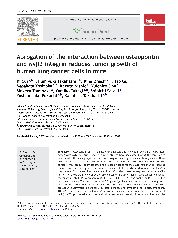摘要
Osteopontin (OPN) is a multifunctional cytokine involved in celt signaling by interacting with alpha v beta 3 integrins. Recent ctinical. studies have indicated that OPN expression is associated with tumor progression and poor prognosis among patients with Lung cancer. However, the biological rote of OPN in human tung cancer has not yet been well-defined. The purpose of this study is to investigate and provide evidence for the causal. role of OPN regarding tumor growth and angiogenesis in human lung cancer. In this study, we developed a stable OPN transfectant from human tung cancer cett line SBC-3 which does not express the intrinsic OPN mRNA. To reveal the in vivo effect of OPN on tumor growth of human Lung cancer, we subcutaneously injected OPN-overexpressing SBC-3 celLs (SBC-3/OPN) and control cells (SBC-3/NEO) into the nude mice. Transfection with the OPN gene significantly increased in vivo tumor growth and neovascularization of SBC-3 ceILs in mice. These in vivo effects of OPN were markedly suppressed with administration of anti-alpha v beta 3 integrin monoctonal. antibody or anti-angiogenic agent, TNP-470. Furthermore, recombinant OPN protein enhanced human umbilical vein enclotheiiat cell. (HUVEC) proliferation in vitro, and this enhancement was significantly inhibited with the addition of anti-alpha v beta 3 integrin antibody. Taken together, these results suggest that OPN plays a crucial rote for tumor growth and angiogenesis of human lung cancer cells in vivo by interacting with alpha v beta 3 integrin. Targeting the interaction between OPN and UvP3 integrin could be effective for future development of anti-angiogenic therapeutic agents for patients with lung cancer.
- 出版日期2007-9
